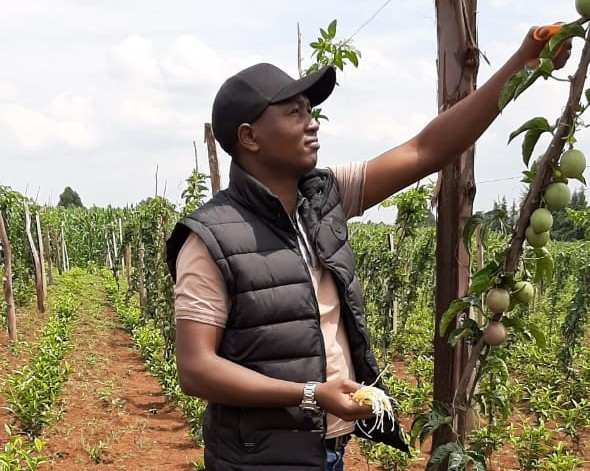Lining up the more than an acre farm in Koilot village, Nandi County, are hundreds of plants propped on wooden poles and spaced about a metre apart.
From afar, one may think that this is a tomato farm but moving closer, beautiful brown passion fruits catch the eye.
The farm belongs to Alfred Leting, 26, who works as a branch manager at Agricultural Society of Kenya (ASK).
Leting literally practices what he tells farmers in his line of duty, with the venture being his side hustle.
“I started passion fruit farming in early 2017 after completing my undergraduate studies. But the thirst to farm had struck me way back in 2012 as I saw my father farm the same crop and get impressive returns,” recounts Leting, who is studying Master of Commerce at Strathmore University, specialising in International Business Management.
Besides the inspiration from his father, passion fruit was his favourite choice because compared to crops like maize, the fruit earns more.
“Its price fluctuation is quite insignificant and one can add value by making juice, which is a favourite drink for many,” says Leting.,who has employed three workers in the family farm..
He grows the non-grafted passion fruit varieties because according to him, they yield better compared to grafted ones and are resistant to drought and diseases and guarantees long lifespan.
This season, he anticipates harvest between 1,200 to 2,000Kgs weekly.
“I have been selling a kilo of the produce for at least Sh70. My main buyers are usually traders who supply to local markets and to Marikiti in Nairobi and some to Uganda.”
Having a full-time job, he runs his farm via telephone and visits once in two weeks. “My father plays a key role in farm management. I have trained my workers and they can comfortably handle the basics. Technology has eased the farm management. For instance, I get pictures of the farm and the crops and I am able to guide what is to be done from the comfort of my work place,” he says.
Working with the ASK, Leting has learnt a lot about modern practices of farming the crop.
“Passion fruit is a climbing plant, thus, it must be supported using poles and firm strands of strong wires to keep the vines suspended for good aeration and room for yields. On the other hand, a farmer should not ignore the suckers mushrooming from sides of the main vines. They suck off the nutrients that would have fed into developing fruits. Therefore, the suckers must be pruned weekly to keep the plant healthy and productive.”
According to him, the only secret to maximum production is to feed the plants well with sufficient water, compost manure, NPK and foliar.
“One should also watch out for diseases and pests, which the fruits are prone to. Passion fruits share diseases with crops like potatoes hence I encourage whoever wants to grow them to consider cultivating a virgin land or at least where potatoes have not been grown before and practice crop rotation.”
He recently lost an acre of the crop to Fusariam wilt, which is a fungal soil borne disease and it attacks the rooting system of the affected plant.
“The disease spreads upwards along the stem and one can easily recognise it by brown patches scattered on the stem. Since the attack originates from the roots, the transaction of water and minerals from the soil are interfered with, and the plant starts to wither and eventually it dies. Sadly, there is no control of this disease once it attacks the plant. A farmer should uproot and destroy it and never again to plant passion fruit on the same land,” he advises.
Being a marketer, Leting knows his way around in both the physical and virtual markets. While in the past months he had no problem selling the produce, Covid-19 pandemic has affected his sales.
“Passion fruits are majorly used for juice production largely in Nairobi hotels and but since most of them closed, this reduced the demand pushing down the prices. Currently, I am selling a kilo at Sh60 as opposed to Sh90-Sh100 because this is the peak season.”
To try and find better market during the pandemic, he joined Mkulima Young, the leading online marketplace.
“Through the platform, I have increased my market and visibility of the produce. In fact, I have received several orders through the platform. Apparently, getting a good market for many farmers is still big deal due to lack of information. Thanks to Mkulima Young fraternity and advanced technology for bridging the gap,” he says.
His advice to the youth seeking to venture into agribusiness is to start small and grow gradually.
“Consistency counts. It is very easy to farm passion fruits if the requirements are adhered to. My focus currently is to expand production and work on improving the quality to fetch international markets as well as ensure sustainability and profitability. I’m also planning to engage and train my neighbours to grow the crop so that we can bulk our produce to enable us get better prices.”
According to International Trade Centre, there is much demand for Kenya’s passion fruits internationally. “This means the prices may slightly fluctuate but the market is constantly available. This is an opportunity for young people to take and flourish. If you have an idle land or family land somewhere, kindly take advantage of this opportunity and you will never regret it.”
Passion fruit is highly rich in Vitamin C, beta-kryptoxanthin and alpha-carotene that boosts immunity.
To buy Alfred passion fruits click here and connect with him without brokers.
Alfred is among the Mkulima Young certified farmers.
Alfred is among the Mkulima Young certified farmers.
Register with Mkulima Young by clicking here

